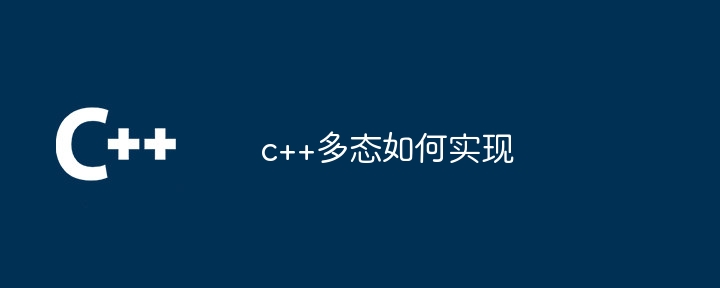Home >Backend Development >C++ >How to implement polymorphism in c++
How to implement polymorphism in c++
- 下次还敢Original
- 2024-04-22 17:54:471084browse
Polymorphism is a mechanism in object-oriented programming that allows objects to have different forms or behaviors. Polymorphism in C is implemented through virtual functions, abstract classes, pure virtual functions, and dynamic binding. Virtual functions allow derived classes to redefine base class methods. Abstract classes contain virtual functions that must be redefined in derived classes. Pure virtual functions have no implementation and only exist in abstract classes, while dynamic binding finds the class to which the object belongs at runtime. correct implementation.

C Polymorphic Implementation
What is polymorphism?
Polymorphism is a mechanism in object-oriented programming that allows an object to have different forms or behaviors depending on the class to which it belongs.
How to implement polymorphism in C?
Polymorphism in C is mainly achieved through the following aspects:
- Virtual functions: Virtual functions are members that can be redefined in derived classes function. When a base class pointer or reference points to a derived class object, calling a virtual function will be dynamically bound to the implementation in the derived class.
- Abstract class: An abstract class is a class that contains at least one virtual function. It cannot be instantiated, only inherited. Virtual functions in abstract classes must be redefined in derived classes.
- Pure virtual function: Pure virtual function is a virtual function without any implementation. It can only exist in abstract classes and must be redefined in derived classes.
- Dynamic binding: When a virtual function is called, C will look for the correct implementation of the class to which the object belongs at runtime. This binding is called dynamic binding.
Example:
Consider the following example:
<code class="cpp">class Animal {
public:
virtual void speak() { cout << "Animal speaking" << endl; }
};
class Dog : public Animal {
public:
void speak() override { cout << "Dog barking" << endl; }
};
int main() {
Animal* animal = new Dog(); // 基类指针指向派生类对象
animal->speak(); // 调用speak()会动态绑定到Dog的实现
}</code>
In this example, Animal is an abstract base class, while Dog is a derived class. speak() is a virtual function that is redefined in the Dog class. When we use the base class pointer to point to the derived class object and call speak(), it will be dynamically bound to the speak() implementation in the Dog class and output "Dog barking".
The above is the detailed content of How to implement polymorphism in c++. For more information, please follow other related articles on the PHP Chinese website!

